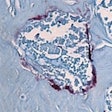Changes in the bacteria in a person's mouth may be an early indication of the onset of pancreatic cancer, according to a new study in Gut (October 12, 2011).
Researchers from the University of California, Los Angeles (UCLA) found variations in the types of bacteria found in the saliva of patients with pancreatic cancer and pancreatitis, compared with healthy controls. The findings may offer a noninvasive biomarker to diagnose and track the development of these diseases.
Working with 10 pancreatic cancer patients and 10 healthy controls, the researchers measured variations of salivary microbiota and evaluated their potential associations with pancreatic cancer and chronic pancreatitis.
Comprehensive comparison of the salivary microbiota between patients with pancreatic cancer and healthy control subjects revealed a significant variation of salivary microflora, the researchers reported.
They found that 31 types of bacterial species were increased in the saliva of patients with pancreatic cancer, compared with healthy controls, and that 25 types of bacteria were reduced. Two out of six bacterial candidates (Neisseria elongata and Streptococcus mitis) were validated using the independent samples, showing significant variation (p < 0.05) between patients with pancreatic cancer and controls.
Additionally, two bacteria (Granulicatella adiacens and S. mitis) showed significant variation (p < 0.05) between chronic pancreatitis samples and controls.
This is the first indication of its kind that an analysis of oral flora can find differences that could point to a mechanism in which pancreatic cancer might develop, according to lead author James Farrell, MD, and associate clinical professor of digestive diseases and director of the Pancreatic Diseases Program at UCLA.

















